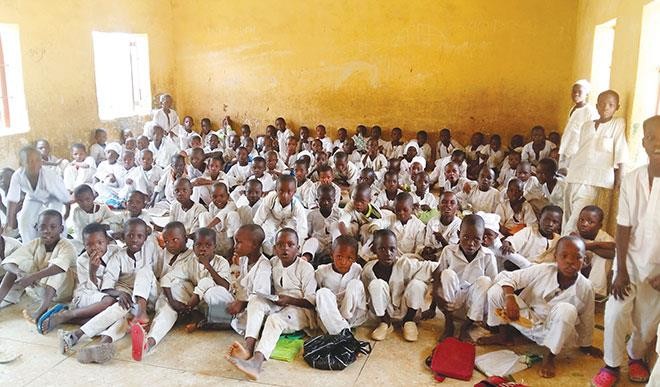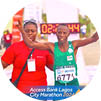
Perhaps Gobirawa Project Primary School is the most populated public primary school, not only in Kano State but the whole of Nigeria. Located at Kurna quarters in Fagge Local Government Area of Kano State, the school was established in 1970 with only 76 pupils but now accommodates 13,743 pupils.
The population of the school comprises of 6,689 girls and 7,054 boys with a total of 7,449 pupils attending morning session while 6,294 others are for the evening session.
The 46-year-old school has one Headmaster, six Assistant Headmasters, 216 teachers, 35 pit toilets and 72 classrooms including six Special Education and four Early Child Care (ECC) classes. Each of the 62 conventional classrooms has A-J classes.
It was observed that the least number of pupils per class is 140, while the maximum is 243. Most of the classrooms have no chairs and tables for both pupils and teachers. While pupils sit on bare floors and some perch on the windows, the teachers stand throughout the duration of lessons.
The teachers sit under trees or at the veranda of some classrooms during break hours since there is no common or staff room for teachers in the school.
Daily Trust gathered that out of the 216 teachers in the school, 196 have a minimum qualification of Nigerian Certificate in Education (NCE), while the rest are currently undergoing their NCE programme in addition to the diploma certificates they already possess.
From the exterior, one wouldn’t notice the existence of such a big school until when the pupils are leaving the school premises after closing hours.
This has left some people to wonder how effective teaching could take place in such a crowded school like that. However, the headmaster, Malam Kabiru Garba Fagge, said with the new method of grouping pupils, teaching is effectively being conducted in the school.
“Once a teacher groups the pupils, it would be easier for him to teach them. Each classroom has three registers. The population of our school has never deterred us from carrying out our mandates as teachers. We always try our best to see that the pupils get adequate knowledge they deserve,” he said.
According to Garba, who is the 27th headmaster of the school, the school has been expanding in terms of structures, size and population since its creation 46 years ago. He added that many people from within and outside the host community help from time to time in running the affairs of the school.
He noted that the school has graduated a lot of influential personalities in Kano State ranging from big business personalities to high ranking military officers and civil servants.
“Though this school is located in Fagge local government area within the state’s metropolis, it currently serves many communities in Fagge, Dala, Ungoggo and Kumbotso local government areas.
“The school is blessed because government had established many primary schools including Durumi, Sule Chamber, Maidorawa, Alpha Kwachiri and one other just to decongest this school but that could not be achieved. I remember when government commissioned a new primary school in the area last year, I donated over 3,000 pupils to the school, but before the end of the session that number was recovered,” he said.
Fagge, who has been the headmaster of the school for five years now, said “I have adopted a method of division of labour among my teachers for effective running of the school. I work closely with my teachers and I sometimes take some classes just to encourage them. To take good care of our pupils, the school has a dispensary with a sick bay and five Physical & Health Education (PHE) teachers present.”
On the free feeding programme, Fagge revealed that the school consumes 10 bags of rice and 2 bags of beans daily for both morning and evening session pupils. The pupils also consume 30 carts of 16 jerry cans of water per day. He, however, said with the construction of two solar boreholes by the Education Sector Support Programme in Nigeria (ESSPIN), the problem of drinking water has become a thing of the past.
“The most interesting thing about this school is that the host community always participates in running the school. Before the coming of ESSPIN to build two solar powered boreholes in the school, the community bore the responsibilities of buying drinking water for our pupils on daily bases. I receive up to 30 carts of water from individuals every day,” he said.
The headmaster, who appealed to government to provide more chairs, tables and other teaching materials for the school, also urged the community to continue complementing government’s efforts by maintaining its assistance to the school. He said government alone cannot shoulder the burdens of educating the society.
Malam Abubakar Shua’ibu Ibrahim is a teacher in the school and he told Daily Trust that “teaching in the school is very fulfilling because of the commitment of both the school leadership and the parents towards improving teaching and learning in the school.
Ibrahim said the academic excellence and standard he has noticed in the school since his stay cannot in any way be compared to that of the other schools he had served within the metropolis.
On the school’s population, he said: “The school has been able to modernize the process of teaching by introducing grouping of pupils and assessing them according to their respective groups. This system has eased teaching and enabled pupils learn from one another.”
“The special education unit of the school is quite interesting; it is meant for deaf pupils. I was not thought about special education, neither did I learn from anybody but here in Gobirawa Primary School, I developed interest in teaching in the special education unit,” he concluded.
Mrs. Aisha Garba, another teacher in the school, said “I was transferred here just two years ago, but I sincerely appreciate the commitment of the school management in terms of taking care of the welfare of both teachers and pupils.”
Both staff, however, called on the state government, parents, agencies and other non-governmental organizations to show extra concern in assisting the school management to further boost the academic standard of the school.

 Join Daily Trust WhatsApp Community For Quick Access To News and Happenings Around You.
Join Daily Trust WhatsApp Community For Quick Access To News and Happenings Around You.


